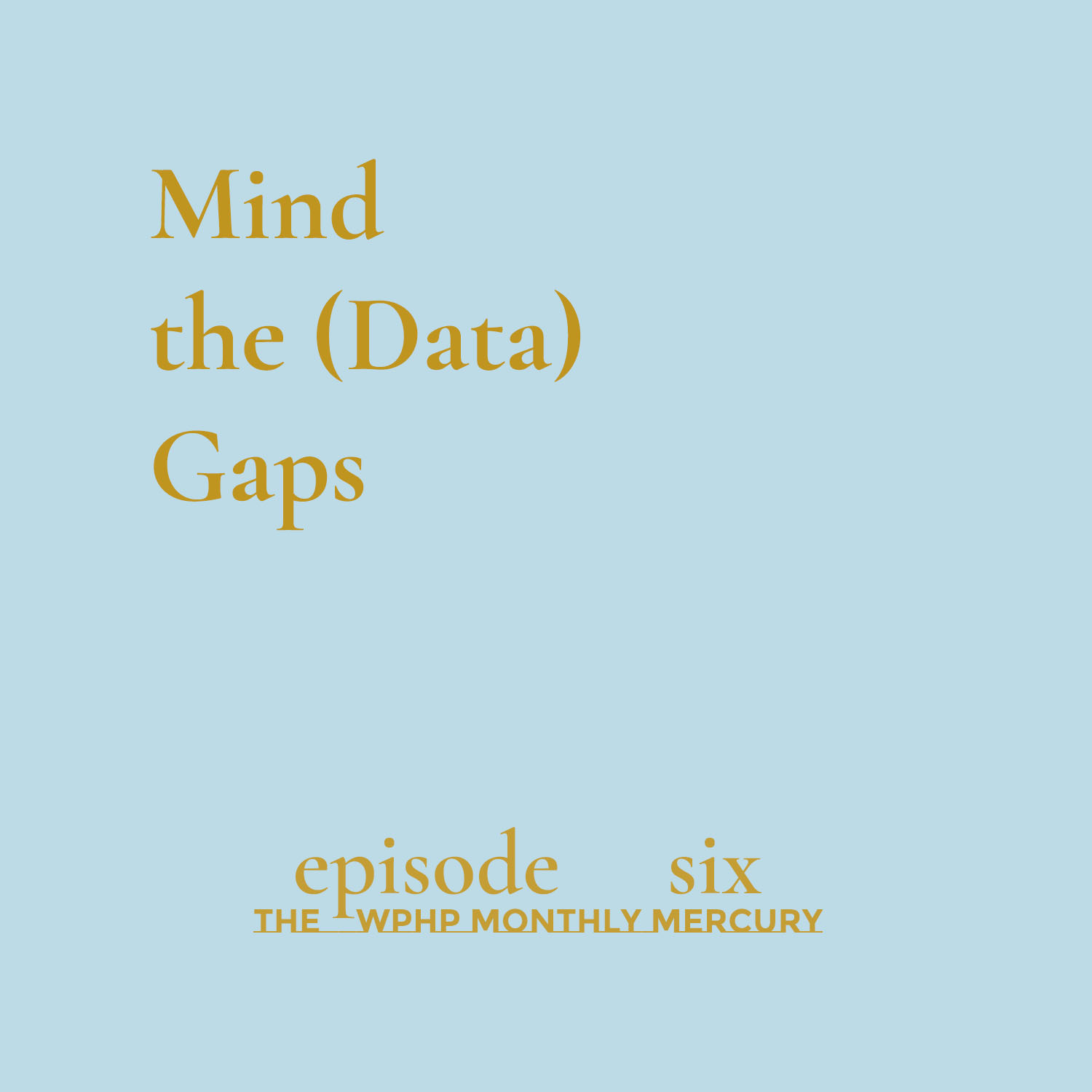
You can listen to Episode 6 of the WPHP Monthly Mercury, "Mind the (Data) Gaps", on Apple, Spotify, Stitcher, Google Podcasts, and other podcast apps, available via Buzzsprout.
Have you ever wondered, “Where does all the WPHP data come from?” Well, look no further than this month’s episode of The WPHP Monthly Mercury! In Episode 6, “Mind the (Data) Gaps”, hosts Kate Moffatt and Kandice Sharren bring listeners behind-the-scenes to explore a few of the many superhero sources we use to create WPHP title data.
The WPHP collects data for titles produced by women between 1700 and 1836; accordingly, this episode briefly introduces you to sources like the ESTC, The English Novel, and the Orlando: Women Writers in the British Isles from Beginnings to Present database, to name just a few! Kate and Kandice also acknowledge where the data gaps lie in the WPHP, how they tend to come about, and how we grapple with them.
And there is grappling required on multiple levels when working with the sources of the WPHP: not only are we managing the gaps in our data, but we are also wrangling the different levels of information provided by each resource. Our data is not a simple replication of what is provided by our excellent sources—rather, we use multiple sources in conjunction with one another, amalgamating what we find to create coherent and cohesive data about the titles in the WPHP to create as full a picture as possible of women’s involvement in print during our period. It is through these efforts, as well as our persistent transparency around our processes, our creation of subject guides and podcast episodes, and our use of widespread and various sources, that we hope the WPHP, too, can contribute to filling some of the existing gaps in women’s book history.
For clarification on some of the bibliographical terms we use in this episode, you can find definitions of terminology in our documentation of title records here. You can also find a full list of our sources here.
Credits
Produced by: Kandice Sharren, Kate Moffatt, and Michelle Levy
Mixed and mastered by: Alexander Kennard
Music by: Ignatius Sancho, “Sweetest Bard”, A Collection of New Songs (1769) from https://brycchancarey.com/sancho/bard.jpg, and played by Kandice Sharren
WPHP Monthly Mercury Episodes Referenced
Season 1, Episode 5: "Of Monks and Mountains!!!"
Season 1, Episode 4: "A Bibliographical Education"
Season 1, Episode 2: "Women in the Imprints"
WPHP Sources Referenced
English Short Title Catalogue (ESTC)
The English Novel, 1800–1829 & 1830–1836: Update 7 (August 2009–July 2020)
Jackson Bibliography of Romantic Poetry
John Newbery and His Successors, 1750-1814
A Bibliography of Eliza Haywood
Osborne Collection of Early Children's Books
Eighteenth Century Collections Online (ECCO)
Nineteenth Century Collections Online (NCCO)
Sabin Americana: History of the Americas 1500–1926
Slavery and Anti-Slavery: A Transnational Archive
Orlando: Women’s Writing in the British Isles from the Beginnings to Present
British Travel Writing: Women's Travel Writing, 1780–1840
WPHP Records Referenced
Burney, Frances (person, author)
Evelina (title)
Cecilia (title)
Camilla (title)
The Wanderer (title)
Ann Lemoine (firm, publisher)
Lemoine, Ann (person, publisher)
John Newbery (firm, publisher)
Francis Newbery (firm, publisher)
Elizabeth Newbery (firm, publisher)
Newbery, Elizabeth (person, publisher)
Haywood, Eliza (person, author)
Eliza Haywood (firm, publisher)
Radcliffe, Ann (person, author)
Works Cited
American Antiquarian Society catalog. American Antiquarian Society, https://www.americanantiquarian.org/.
Bearden-White, Roy. How the Wind Sits; or, the History of Henry and Ann Lemoine, Chapbook Writers and Publishers of the Late Eighteenth Century. 2007. Southern Illinois University Carbondale, M.A. Thesis.
British Library catalog. British Library, www.bl.uk/.
British Travel Writing: Women's Travel Writing, 1780–1840. U of Wolverhampton, 2014, www4.wlv.ac.uk/btw/.
Eighteenth Century Collections Online. Gale, www.gale.com/primary-sources/eighteenth-century-collections-online.
English Short Title Catalogue. British Library, www.estc.bl.uk/.
Garside, Peter, James Raven, and Rainer Schöwerling, eds. The English Novel, 1770–1829. Oxford UP, 2000.
Garside, Peter and Anthony Mandal, eds. The English Novel, 1830–1836. Cardiff, Centre for Editorial and Intertextual Research, 2003.
Google Books, Google Inc, www.books.google.com/.
HathiTrust Digital Library. U of Michigan, www.hathitrust.org/.
Internet Archive. 1996, www.archive.org/.
Jackson, J. R. de J. Jackson Bibliography of Romantic Poetry. U of Toronto, 1975, www.jacksonbibliography.library.utoronto.ca/.
Leuner, Kirstyn, Deborah Hollis, and Kate Ozment, eds. The Stainforth Library of Women’s Writing, www.stainforth.scu.edu.
Nineteenth Century Collections Online. Gale, www.gale.com/primary-sources/nineteenth-century-collections-online.
Nygren, Catherine. "Women's Travel Writing." Unpublished dataset, 12 September 2018.
Orlando: Women’s Writing in the British Isles from the Beginnings to the Present. Cambridge UP, 2008, www.orlando.cambridge.org/.
Osborne Collection of Early Children’s Books. Toronto Public Library, 1949, www.torontopubliclibrary.ca/osborne/.
Roscoe, Sydney. John Newbery and His Successors. Five Owls, 1973.
Sabin Americana: History of the Americas 1500-1926. Gale, https://www.gale.com/sabin-americana-history-of-the-americas-1500-1926.
Slavery and Anti-Slavery: A Transnational Archive. Gale, https://www.gale.com/primary-sources/slavery-and-anti-slavery.
Spedding, Patrick. A Bibliography of Eliza Haywood. Pickering & Chatto, 2004.
This podcast draws on research supported by the Social Sciences and Humanities Research Council.
